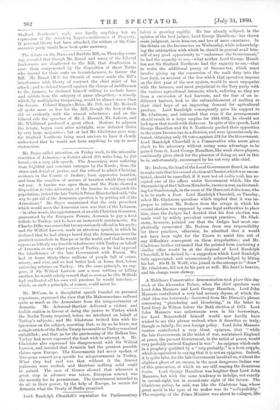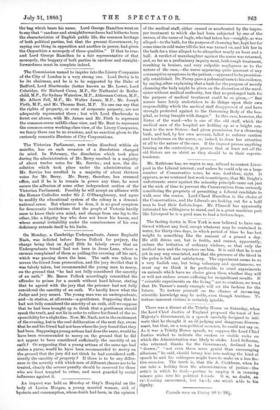A Middlesex Conservative demonstration took place this day week at
the Alexandra Palace, when the chief speakers were Lord John Manners and Lord George Hamilton. Lord John Manners contributed a very bad nursery rhyme, of which the chief idea was borrowed ;—borrowed from Mr. Disraeli's phrase concerning "plundering and blundering," in the letter to. Lord Grey de Wilton before the Bath election of 1873. Lord John Manners was unfortunate even in his borrowings, for Lord Beaconsfield himself would now hardly have wished to see this phrase revived, when it describes so truly; though so faintly, his own foreign policy. Lord John Manners further contributed a very blunt epigram, that "while the late Government, in the midst of war, maintained England at peace, the present Government, in the midst of peace, would. very probably embroil England in war." An epigram which ends in a prophecy qualified by a "very probably," is a born cripple, which is equivalent to saying that it is not an epigram. Indeed, it is quite false, for the late Government involved us, without the slightest ghost of an excuse, in the most dangerous Indian war of this generation, of which we are still reaping the disastrous fruits. Lord George Hamilton was brighter than Lord John Manners, but with the same tendency to indulge, not exactly in second-sight, but in second-rate sight of the future. The Gladstone policy, he said, was like the Gladstone bag, whose great merit in the eyes of its maker was its "collapsibility." The majority of the Prime Minister was about to collapse, like
the bag which bears his name. Lord George Hamilton went on to say that "candour and straightforwardness had hitherto been the characteristics of English public life, the common heritage of both political parties, but that the present Government, by saying one thing in opposition and another in power, had given the Opposition a monopoly of those qualities." If that be true, and Lord George Hamilton be a fair representative of that monopoly, the beggary of both parties in candour and straight- forwardness must be complete indeed.



































 Previous page
Previous page